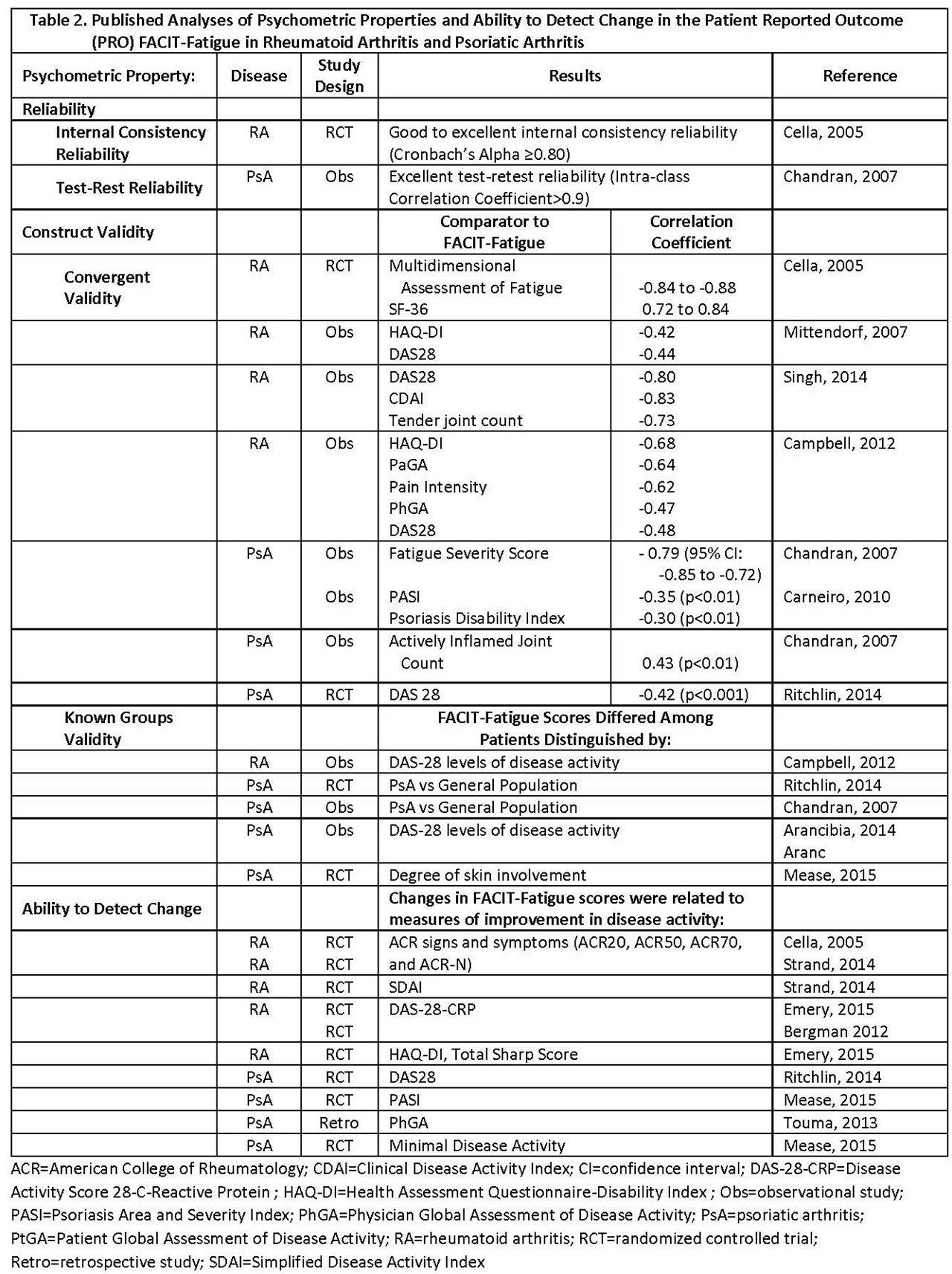Session Information
Session Type: Poster Session (Monday)
Session Time: 9:00AM-11:00AM
Background/Purpose: Fatigue is an important patient reported outcome in rheumatoid arthritis (RA) and psoriatic arthritis (PsA) research. FACIT-Fatigue is a 13-item patient reported outcome (PRO) instrument designed to assess fatigue and its impact on daily activities and function over the past seven days. In this study we reviewed published evidence on the psychometric properties of FACIT-Fatigue in patients with rheumatoid arthritis (RA) or psoriatic arthritis (PsA) including content validity, reliability, , and ability to detect change.
Methods: For content validity, a search of PubMed and Ovid databases used the following terms: (“conceptual” OR ”content validity” OR “qualitative” OR “debrief*”) AND (“rheumatoid arthritis”/”psoriatic arthritis” OR “RA”/”PsA”) AND “fatigue”. For the psychometric measures, the search used the following terms: (“FACIT-F” OR “FACIT-Fatigue” OR “FACIT Fatigue”) AND (“rheumatoid arthritis”/”psoriatic arthritis” OR “RA”/PsA”) AND “fatigue.” Search filters were used to exclude: 1) articles that are not available in the English language; and 2) articles not published within the last 15 years (2001 – 2016). Abstracts and full-publications involving observational cohorts and clinical trials were reviewed for reports of FACIT-Fatigue psychometric properties in RA and PsA patient studies.
Results: A total of 81 papers were included in this study. The content of the FACIT-Fatigue items maps well to descriptors used by patients to express their experience of RA-related fatigue, and almost all of the items (except the item “too tired to eat”) were found to be acceptable by patients, supporting its content validity. The instrument also possesses good to excellent reliability, including Cronbach’s alpha (≥ 0.80), test-retest reliability, and intra-class correlation. Moderate to high correlations were also found between the FACIT-Fatigue and other measures of fatigue, as well as measures of disability and disease activity, such as HAQ-DI, DAS28, Psoriasis Area and Severity Index and, Psoriasis Disability Index. The known-groups validity of the instrument was also demonstrated in studies of RA and PsA patients based on disease status and scores relative to the general population. Studies also showed that changes in FACIT-Fatigue scores were associated with changes in multiple clinical outcome measures, such as ACR improvement criteria, changes in DAS28, and physician global assessment, suggesting the ability of the FACIT-Fatigue to detect changes in RA and PsA disease activity. Table 1 summarizes the content validity evidence and Table 2 provides summaries of the psychometric properties of FACIT-Fatigue.
Conclusion: This review demonstrated evidence of content validity and strong psychometric properties of FACIT-fatigue in patients with RA and PsA, supporting its use in RA and PsA studies.
To cite this abstract in AMA style:
Husni M, Kosinski M, Rendas-Baum R, Kafka S, Han C, Chan E, Hsia E, Kavanaugh A. Psychometric Properities of the Patient Related Outcome Measure FACIT-Fatigue in Rheumatic Arthritis and Psoriatic Arthritis: A Literature Review [abstract]. Arthritis Rheumatol. 2019; 71 (suppl 10). https://acrabstracts.org/abstract/psychometric-properities-of-the-patient-related-outcome-measure-facit-fatigue-in-rheumatic-arthritis-and-psoriatic-arthritis-a-literature-review/. Accessed .« Back to 2019 ACR/ARP Annual Meeting
ACR Meeting Abstracts - https://acrabstracts.org/abstract/psychometric-properities-of-the-patient-related-outcome-measure-facit-fatigue-in-rheumatic-arthritis-and-psoriatic-arthritis-a-literature-review/


